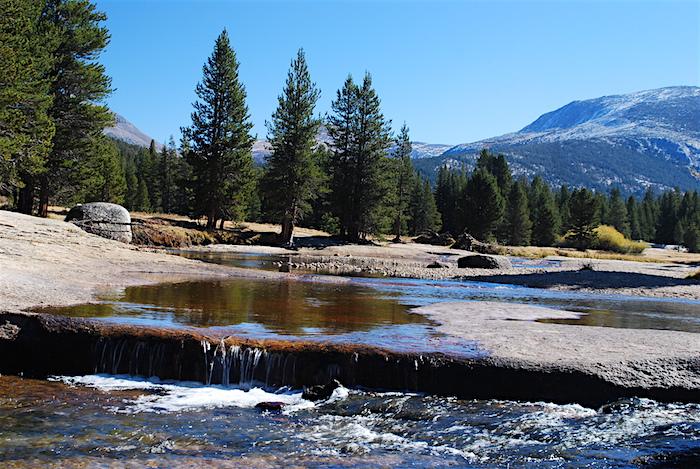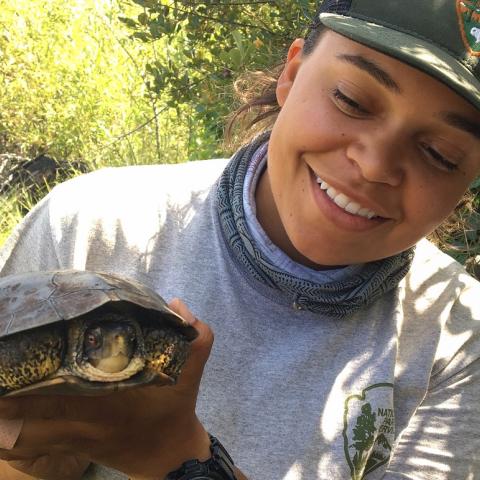
Many of the iconic national parks are jam-packed this summer, but you can find areas away from the crowds, such as here along the Lyell Fork of the Tuolumne River in Yosemite, if you get out early/Kurt Repanshek
Traffic stretching more than three miles from a national park entrance station. Parking areas inside some national parks filling by 10 a.m. National park superintendents acknowledging that the visitor experience is being impacted.
If there was any doubt that America's national parks are popular with tourists, this summer's traffic erased it.
At Mount Rainier National Park in Washington, some days the line of vehicles waiting to pass through the Nisqually Entrance Station can back up 3.5 miles and take two hours to negotiate. At Rocky Mountain National Park in Colorado, the parking area at ever-popular Bear Lake routinely fills by 10 a.m. At Grand Canyon National Park in Arizona, the lines to enter the South Rim have half-seriously been compared to the lines for tickets to the popular Broadway show Hamilton.
And at Yellowstone National Park in Wyoming, Superintendent Dan Wenk says crowding is his top concern, and that, "The experience is being affected."
So hectic has business been at the icons of the National Park System that the Chicago Tribune called for daily quotas to be established.
Something's wrong with our national park system when lines to get to the Grand Canyon's South Rim look like lines to get "Hamilton" tickets. America's annual pilgrimage to our national parks has become a shoulder-to-shoulder, bumper-to-bumper stress test.
At Yosemite National Park, officials agree that parking can be a challenge. Even though the park has a shuttle system to help move people around the scenic Yosemite Valley, some visitors complain that, "it’s frustrating because of all the time you spend in traffic.”
In Washington state, while the editorial board of The News Tribune laments the crowding and exhaust, it urges visitors to endure.
"...the important thing is not to let all this talk of traffic congestion deter you from going at all; it should only serve to improve your travel strategy. If anything can renew a weary spirit, it’s Mount Rainier," the board wrote, adding, however, "(A)s you’re waiting to pay your entrance fee and motor up the mountain, remember why you’re there. Don’t sit in your car and seethe. Save that for when you’re searching for an elusive parking spot higher up the mountain."
Mount Rainier officials, who say traffic issues will compound the high visitation levels through late October as road construction continues, aren't shying away from the issue.
"Is the parking lot full? Perhaps the trail is busier than normal, or maybe you waited in a long line to enter the park?," they wrote in their weekly construction update. "All signs of a busier than normal summer here at Mount Rainier. Each year we welcome over one million visitors, and 2016 might break past records as the busiest year. Over the last 100 years park visitation has increased from around 24,000 in 1916 to around 1,200,000 in 2015. Some say the 'more than merrier,' while others feel we are 'loving parks to death.' Where do you stand?"
So, where do you stand?




 Support Essential Coverage of Essential Places
Support Essential Coverage of Essential Places







Comments
Seems a little late but at least they finally recognize it. Instead of quotas (which may needed short term). How about reverting the parks to what they once were. Places to get close to nature. We don't need elaborate nature centers. overpriced hotels, gourmet restaurants and 40 foot motorhomes. Make more of the campground / sites tent only. Stop paving "hiking" trails and adding roads. And as much as I enjoy a hot shower after a hard day of hiking I'd even be ok with getting rid of the hot part. I seem to remember never having hot showers in the good old days. Perhaps get rid of all the cell towers and wifi. I suspect the overcrowding would then take care of itself.
The above would be all well and good, except for the fact that if people can't stay in the park, they would crowd the towns immediately around them, making more people drive to get into the parks. Which would make congestion getting into a park worse.
Fortunately for me the park I visited was not that crowded, but then it wasn't Yosemite, Yellowstone, the Grand Canyon, or the Great Smoky Mountains. Two of the four ranger-led hikes had only seven hikers including the ranger. I think the largest group was only 14. If you pick your park and the time of visit carefully, you can still have a great wilderness experience without the crowds.
There simply are no GOOD answers. I'm glad I won't have to face this much longer, but my grandkids will. Good luck, children.
I was in Yosemite last week. No traffic jams, easily found parking in the valley and saw empty campgrounds. Even the cables weren't that crowded.
The answer is simple at Rainier...once the number of cars entering the park equals available parking spaces all further entry is ONLY allowed in shuttle busses.
I agree mostly with your last two sentences. My husband and I have enjoyed Yosemite for a lifetime, particularly playing cards at all the little tables in the lobby of the Ahwanee Lodge. On our last visits we were shocked to find all the card tables gone and every last place to sit was filled with teens & twenty-somethings all on their phones & I-pads! I just wanted to shout "Have you been OUTSIDE and seen the magnificence of this place? So no cell phone or WiFi might work!!
We visited 7 parks over 2 weeks this year. Some were quite crowded (Zion) and other quiet and empty (Great Basin). We enjoyed Great Basin probably the most due to the low crowds and friendly accessable staff. One thing that we did find however, even at Great Basin, is that some rangers were quite in experienced. In looking for advise for trails they sounded like they had never been out of the ranger station.
We also strategized for crowds, which also helped with heat. We got up early and often entered the park by 6 or 7 a.m. In one case, Arches, we were there before the gate was even taking payment on adminssions (which is another issue).
It did get busy in several places, including Zion and Arches. But as noted in the photo of the article, if you do a little research you can find pretty if not iconic, places to visit and not be overwelmed with crowds.